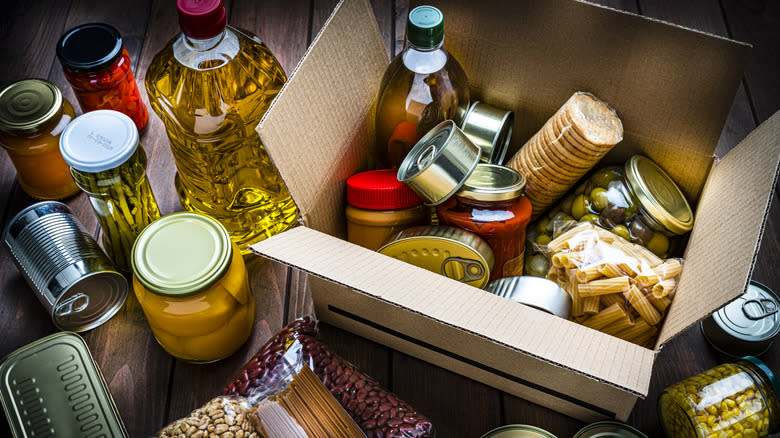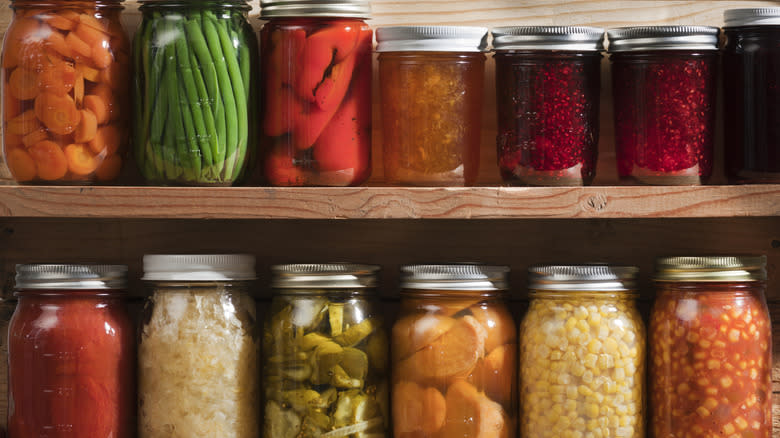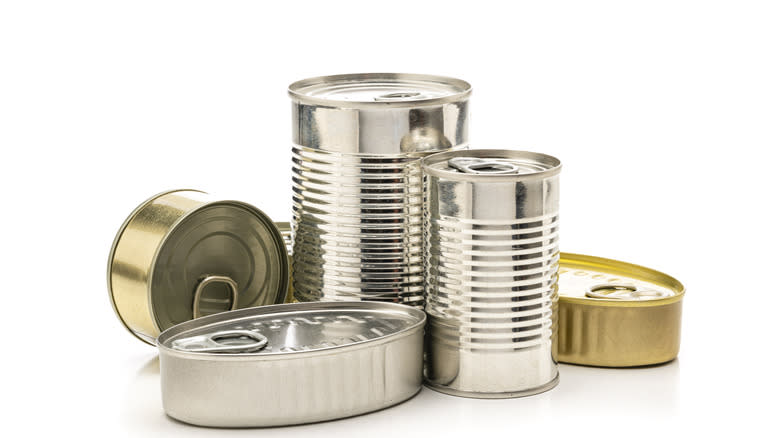The Safety Tip To Remember When Storing Canned Goods

Whether you are buying them from the store or canning your own vegetables and fruits at home, it's important to know how to properly store your canned goods. According to the USDA, canned foods last 18 months on average but can be good for up to five years, depending on whether it has a high or low acid content. However, you can shorten the lifespan of your canned goods if you're not careful. In particular, you want to make sure that you avoid putting too much weight on them.
Canned foods may be easy to stack in one's pantry, but that doesn't mean you necessarily should. In particular, if you've canned veggies or fruit at home, stacking jars on top of each other can mess up the seals on the jars. If you stack your cans too high, you may also wind up accidentally knocking them all over.
While canned foods may seem sturdy and durable, they can be damaged if improperly stored. As registered dietitian Tricia Best told AllRecipes, "Avoid piling heavy items on your canned goods to prevent damage and store the cans separately or in sturdy containers, where they won't be subjected to pressure." That added weight and pressure can cause cans to bend and even break, and the last thing you want is a hole in your canned goods.
Read more: 13 Canned Foods You Should Avoid At The Grocery Store
Don't Risk Potential Food Poisoning

It's important not to risk the sanctity of your cans, as damaged canned food can potentially cause food poisoning. According to the USDA, you should actively avoid a jar or can that's been badly damaged. When it comes to cans, you should avoid cans that are badly dented. Tell-tale signs that your canned goods may have gone bad include a bulging can that may have a bad smell to it. For the same reason, you should also avoid any jarred foods that have cracks in the glass or loose lids. Bacteria growth causes both jars and cans to expand due to the increase of pressure from inside.
You should avoid tasting any suspected spoiled canned goods for fear of botulism. According to the Centers for Disease Control and Prevention, botulism is caused by Clostridium botulinum, Clostridium butyricum, or Clostridium baratii bacteria. It typically grows in low-oxygen environments, which makes it a particular risk with canned goods. Per the USDA, a small amount of the botulism toxin has the potential to be fatal. The toxin from the bacteria can also be spread through skin contact, so it is recommended that you wear gloves when cleaning any damaged cans or jars.
How To Properly Store Canned Foods

The best way to maximize the lifespan of your canned goods is to properly store them. As mentioned above, you probably shouldn't stack your cans or place them under too much weight, but there are easy ways to organize your cans. If you have a pantry, we recommend installing some wire shelving. You can place wire shelves on the backside of your door, which conserves space and makes for easy access. Wire shelving also prevents overcrowding and makes it easy to conveniently grab a can when needed.
Alternatively, you can use soda can boxes for quick and easy storage. Instead of throwing away those cardboard containers, consider repurposing them instead. While this storage hack may not work for jars, it should be easy to fit canned goods inside. Whatever way you choose to store your canned goods, be sure to keep them in a cool place and avoid any direct contact with the sun. You also want to keep them in a dry place to avoid moisture, so the fridge may not be the best place. Cabinets and pantries are probably your best bet since they're relatively cool compared to other parts of the house.
Read the original article on Daily Meal.
